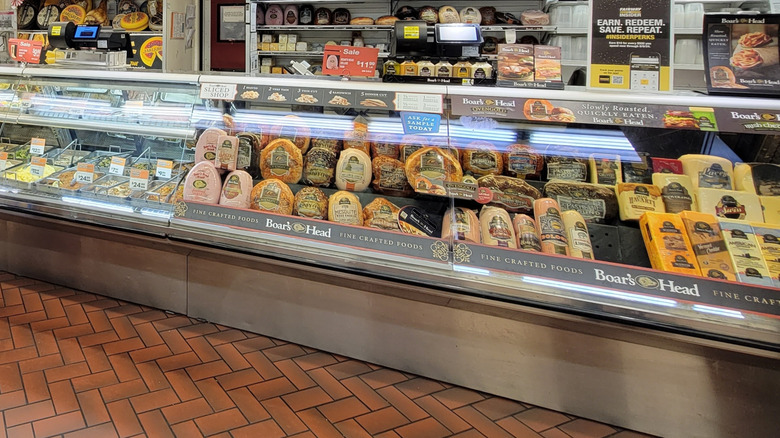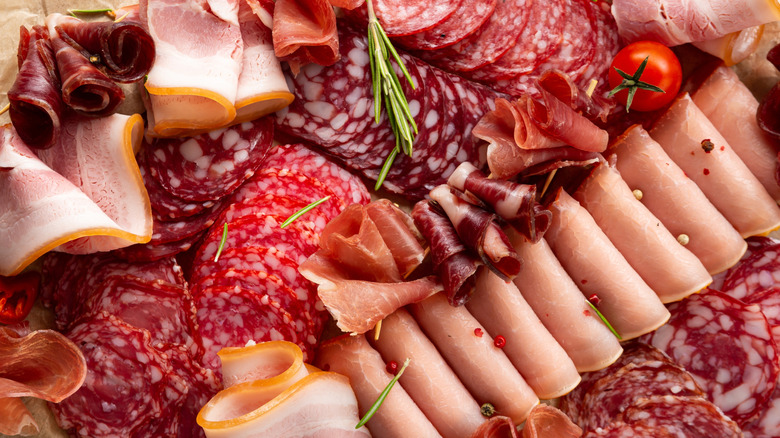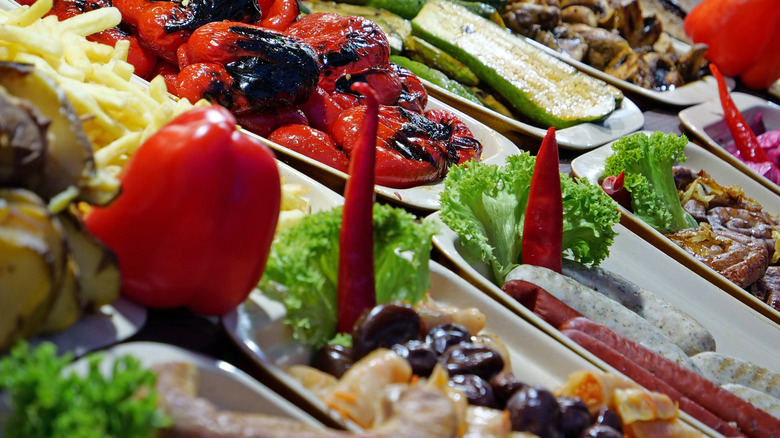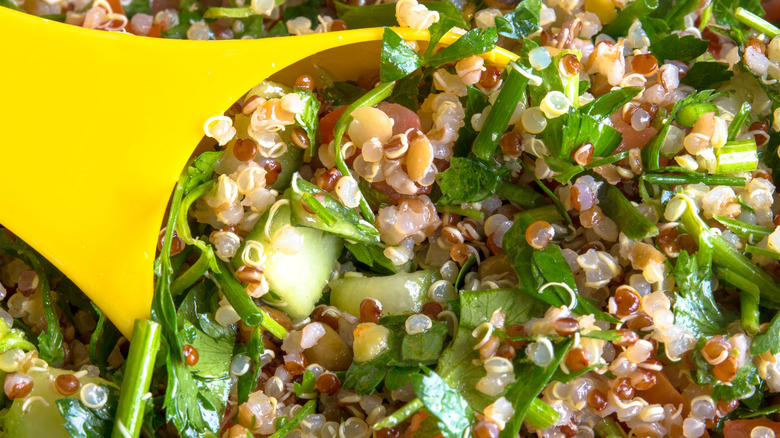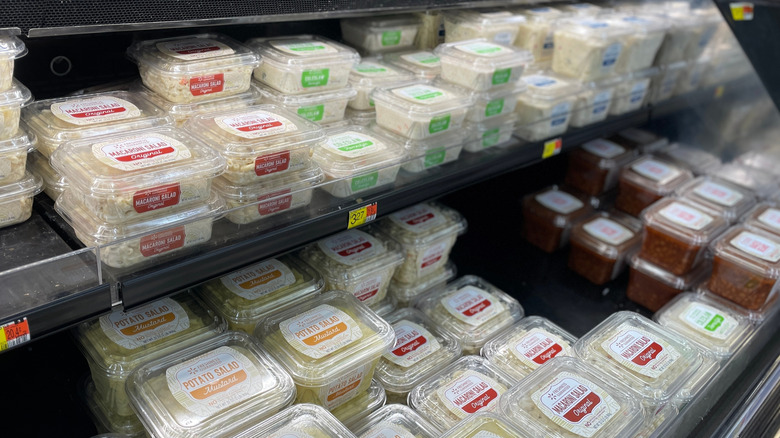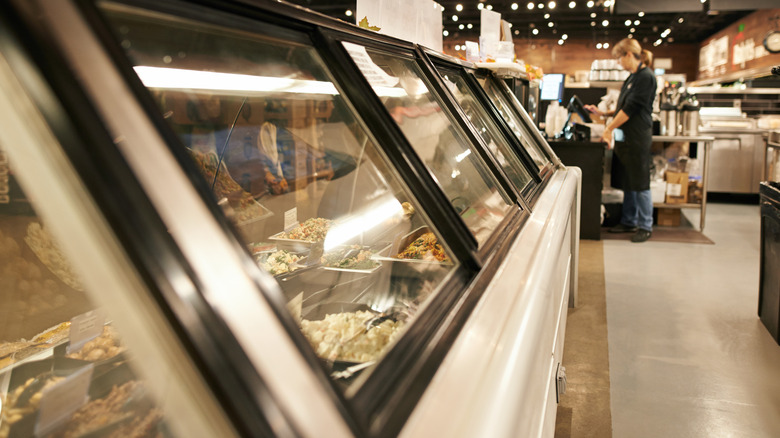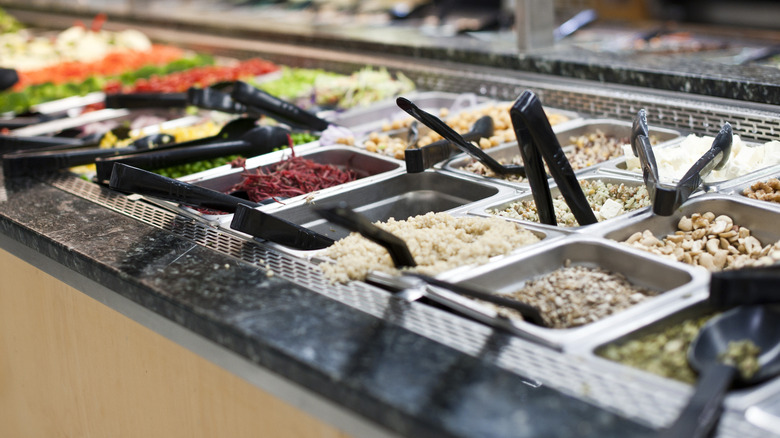10 Myths About Delis You Thought Were True
If you were lucky enough to grow up with a neighborhood deli, you probably have some fond memories of going there to get your favorite cuts of meats — sample slices and all — along with other specialty treats. Delicatessens, or delis, have historically been particularly popular in big cities like New York City (where they were founded by European immigrants in the early 1900s), Chicago, and Philadelphia.
Whether it be staying within a comfort zone or a lack of access, many people stick to their grocery store out of convenience instead of venturing out to a standalone specialty deli. This may lead to some preconceived ideas about delis that make it intimidating or undesirable to try out. However, you may be missing out on some great quality shopping, especially at some of the best delis in the country! Read on to see some commonly known myths about delis be debunked, along with some tips on how to make the most out of your deli experience.
Myth: Delis are an American thing
Like diners, delis have been a staple in many iconic American movies and TV shows. This may lead you to believe the delis are strictly an American gathering place.
It's safe to say delis are popular in the States, with total deli department sales on the rise, exceeding $41 billion in 2020, double the sales in 2014. Though delis are credited for coming to the United States as early as the 1880s, delis are actually popular across the world, and were around in Europe long before the concept reached the States via immigrants. The word itself showcases the international influence, with "deli" being derived from the German word "delikatessen," translated as "delicious things to eat." It is believed delis date back to the 1700s in Europe, providing mostly premium meats and cheeses. A renowned German deli, Dallmayr, was the first to start importing fruits for sale. German delis today are also known for sausages, pretzels, and candy.
Though Volk's Delicatessen, thought to be the first deli in the States, was known for its cured meats, you will likely find sandwiches, soups, salads, and other dishes in delis now. This makes American delis similar to Russian kulinariya, which serve prepared foods along with meats and cheeses. In fact, it is said the Reuben sandwich was invented at a New York City deli in the 1900s, so the creativity has been at delis from the beginning.
Myth: Delis are always unhealthy
You have likely heard that processed deli meats are not the most ideal choice in regard to health. "Stay away from most sliced or ready-to-slice meats due to being highly processed and high sodium," said Chris Darling, Chief Commercial Officer at Mama Creations. While this may be true, that doesn't necessarily mean that delis have no nutritious options for those sticking to a lower-sodium or health-conscious diet. "Gravitate to fresh in store made or "clean" product labels," Darling said, urging shoppers to check the labels for fewer ingredients.
If you can't curb the sandwich craving, you can search the deli for a low-sodium or nitrate-free leaner option like turkey or chicken. Moderation is a key consideration in enjoying your deli meats. Delis can also have healthy options in their prepared foods section. A rotisserie chicken can be a healthier choice than a highly processed deli meat like bologna or salami. Other healthy suggestions include soups with a broth base instead of higher-calorie cream-based soups, roasted vegetables, or bean salads for a kick of protein without a mayonnaise-based dressing. So delis aren't always full of unhealthy, diet-breaking dishes.
Myth: Delis are more expensive
It is generally believed that specialty products found at smaller gourmet markets or stores are more expensive than the grocery store alternatives. A common assumption that some people make about delis is that they are more expensive than other departments, according to Chris Darling. Depending on external pricing factors, you may find that deli meats do cost more per pound than some pre-packaged options (though the difference in quality and taste may pay for itself). Your deli may even have a pre-sliced selection already packaged for a lesser cost.
But you should be aware that you can rack up quite a bill at a deli when it comes to the delicious prepared food that lines the glass cases. You likely pay for convenience, as premade foods can be more expensive than cooking or combining them yourself. One deli clerk told Mashed that the pizza available at the deli counter already cooked was the same store-brand pizza from the frozen aisle, marked up at twice the price. That may not be the case at all delis, but this is just one example of what to look for in navigating delis cost-effectively.
Myth: Delis only sell meats or cheeses
While delis were once known as strictly meat and cheese purveyors, that is not the case anymore. Chris Darling says that one of the biggest misconceptions people have about delis is that they only sell meats, cheeses, and salads. Nowadays, there are a plethora of hot deli-prepared foods and meals perfect for grabbing on the go. In fact, data from 2021 showed just how popular deli-prepared foods and deli meals are, as they had the highest share of total deli department sales in the United States with nearly 50%. If that didn't convince you delis are so much more, the most sales within prepared foods and meals were deli entrées, deli prepared meats, and deli salads.
That being said, gourmet meats and cheeses are a huge draw for delis. If you opt for exploring the traditional deli counter, try one of the varieties of cheeses that you haven't seen before. Many delis offer specialty cheeses from different regions that may not be as readily available at the larger chain stores. Delis likely offer samples, too, so you can try before you buy.
Myth: Delis only offer basic salads
When you swing by a deli to grab a side dish for a picnic or potluck, you may automatically think of the stereotypical macaroni salad or potato salad. These mayonnaise-based salads are classic choices loved by many, but contrary to popular belief, your deli likely offers many more salad options than you may realize. In an effort to provide healthy gourmet options for consumers, salads rich in beans, vegetables, or healthy grains are growing in popularity. Some creative salad options include quinoa salads or legume-heavy bean and lentil salads.
But if you can't skip the carbs, search your deli for a pasta salad with an olive oil-based Italian dressing like pasta primavera. The same goes for potato salad — check for a German-inspired potato salad dressed in a mustard vinaigrette instead of mayonnaise so you still get your favorite salad with a twist. Creamy coleslaw has even gotten a makeover at delis with vinegar-based slaws on the rise.
Myth: Deli food is not as fresh
One big worry many shoppers have about delis is that the food behind the glass case at the deli counter has been sitting out for hours and is no longer fresh. However, experts say that may not be the case. "Smaller delis tend to make more items fresh," said Chris Darling, adding that is one of the benefits of utilizing a smaller, family-owned operation. You can also ask where the deli sourced their food, as many prepare items in-house or source from local suppliers for optimal freshness. Darling also suggested being mindful of what you select by ordering high-demand items that likely are being turned over quickly.
But if you are still worried about freshness, particularly with pre-made deli food items, Darling said the packaging can provide key information. "All deli foods will be labeled with either a use by or expiration date. Look at appearance of food if visible in packaging," he said. "In-store slice meats should be bright in appearance, never should feel slimy or have a bad odor."
Myth: Delis are not as clean
Cleanliness is an important factor in any food service industry, and delis are no exception. Since you can't see behind the counter at the food preparation stations, you may assume that delis are not as clean as you'd like. But cleanliness is one telling factor that separates a good deli from a subpar deli. "Seeing a clean deli is a good indicator it is well run and likely to have fresh products," said Chris Darling. Some basic things to look out for in a good deli are if workers are frequently cleaning and changing gloves, there is good sanitation, and there are multiple slicing machines for different products, according to Darling.
The separate machines in delis are key when slicing meats and cheeses, as you don't want the meat to end up on cheese for both food safety reasons and dietary reasons. Slicer cleaning is also important and a high priority to keep foodborne illnesses at bay, as companies come up with easier ways to clean slicers. With cleaning regulations at a corporate or even a national level with the U.S. Food and Drug Administration, it shouldn't be assumed that delis are not as clean as any other food establishment.
Myth: Customer service is lacking
The rule of quality over quantity can debunk the myth that delis just don't have the infrastructure to provide good customer service. While it may look like smaller delis don't have as many employees as larger chains, the specific number of employees isn't necessarily an indicator of good customer service and an overall great deli. "Smaller [delis] often are family-run or have long-term employees that may show more care for products and customers," said Chris Darling. But there is a flip side to not having a huge staff. "However, you do want to be sure the deli is well-staffed so you know each person can be careful and focused," Darling added.
Some delis are even known for their superb customer service. Zingerman's Deli in Ann Arbor, Michigan, even published a book to serve as a guide to giving great customer service in any industry, which expanded to an entire business training offering.
Myth: You can't ask questions
It can be intimidating fighting your way through a busy deli only to get up to the counter and be unsure of your order. It can feel like the other customers in line are impatiently waiting, but don't feel pressured. While it may seem like the deli workers have no time for customer questions, you should still feel empowered to take your time forming your order. Your deli worker can use their expertise to help you make key decisions on meat flavors, the thickness of your cut, and how much you should order. Plus, you may find some new favorite selections that you can depend on for future visits, thus making ordering quicker in the long run.
Asking questions is also important when it comes to quality assurance. Chris Darling says that you can ensure your meat is fresh by asking your deli associate about the dates on the packaging. "Any bulk meat or cheese that is ready to slice should have a date on the original package that a deli clerk can share with a customer," said Chris Darling. "Don't be afraid to ask to have a new bulk meat or cheese opened before slicing if the existing one is getting toward the end."
Myth: Delis aren't for vegetarians or vegans
Since delis are commonly thought of as big meat and cheese providers, you may wrongly assume that there aren't many options for the vegetarian population beyond salads. However, delis have started to embrace plant-based proteins in recent years as a response to customer demand for healthy, environmentally conscious food options. And it's not only vegans and vegetarians seeking plant-based options, as the same research found 86% of plant-based food consumers don't fall into the vegetarian or vegan category.
Some vegetarian-forward options that are believed by industry leaders to be growing in popularity at delis are vegetarian or vegan chili, ancient grains, plant-based sushi, and gourmet pickles. Some delis have embraced vegetable- and legume-forward sandwiches, and saw a growth in popularity among the non-vegan population, too. Deli insiders say that the prepared food section of delis can be a slam dunk for non-meat-eaters with foods influenced by Chinese, Indian, Italian, and Thai cuisines, which are plentiful in vegan options.

